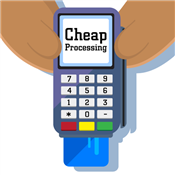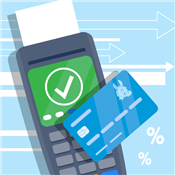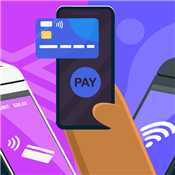How Do I Accept a Credit Card Payment?
Letting customers pay with a credit card is a good way to make more money. Learn how your small business can start to accept credit cards.
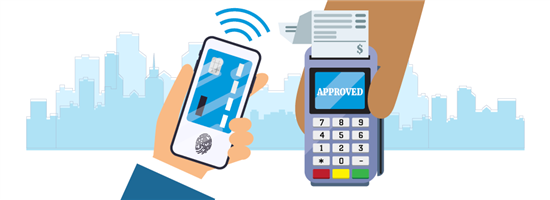 |
Credit card processing has benefits for businesses of all sizes, including:
- Increased sales
- Increased purchases by impulse buyers
- Fosters a feeling of trust in your business when the card network logos are displayed
- Stay competitive in your industry
- Increased cash flow
- Reduce the risk of accepting bad checks
But accepting credit card payments requires a company to process them for you. Keep reading to learn how to get started.
Square Reader: Free Mobile Credit Card Reader
- Pay 2.6% + 10¢ Per Swipe for Visa, Mastercard, Discover, and American Express
- Accept Credit Cards Anywhere
- Fast Setup, No Commitments
Benefits of Accepting Credit Cards
Credit card processing can get pricey. But it's worth adding to your budget due to the following benefits.
- You can get an increase in sales.
More and more consumers are using plastic for payment. According to research from Deloitte, credit card transactions grew from 2016 to 2018, while the percentage of customers who pay cash declined.[1]The Federal Reserve Bank of San Francisco also mentions that card payments for 2021 came to a whopping 57%.[2] That means if you don't take card payments, you could miss out on customers.
Not to mention, cash in people's wallets is limited. Credit limits far more exceed this. And more payment methods available mean more target customers.
- Your business becomes more trustworthy.
Your business will seem more legitimate if you display logos of major credit cards. Big brands like Visa and Mastercard are already established and trusted by customers. When you work with them, customers will be more comfortable transacting with you. - It creates convenience for your customers.
Paying with cards is more convenient for many customers. It only takes a tap, swipe, or dip to pay without having to worry of change.You can also easily catch the attention of impulse buyers. Being able to use credit means they can make larger purchases.
- Customers can earn rewards.
Credit cards typically have reward systems. That means if you let customers pay with a card, they can earn points from your business. You never know if they can get cash back or travel rewards from their cards because of you. - It can improve your cash flow.
If you're a service business, you're likely using invoices or checks to accept payments. But it can be time-consuming waiting for payments. If you have a mobile POS, for example, and you accept cards, you can receive your payment right away.With POS systems, you can typically get your money the next day through next-day transfers. Or you could access them instantly for a fee. - It eliminates the risk of bad checks.
If you accept check payments, then you know there's a risk of bad and bounced checks. Accepting card payments removes this risk.Checks also have processing fees anyway. Plus, you could end up paying bounce fees if the customer account has insufficient funds.
- You get a competitive advantage.
If you accept credit card payments, that means you can cater to more customers. Compared to a business that only takes cash payments, you have the advantage. Not to mention, more and more businesses are now beginning to accept card payments.Also, most online purchases are paid with credit cards. So, if you have an online website, accepting credit cards can make the checkout process for your customers more seamless.
Pro tip: If you have a brick-and-mortar store and an online store, you can opt for POS systems with an omnichannel selling feature. That way, inventory and other payment information are synced. Accessing them in one dashboard can make it easier for you.
Choosing the Right Credit Card Processing Company
 |
Choosing the right credit card processing company is crucial to your business model. First, you must choose between a merchant account and payment service provider (PSP).
Technically, you can't accept credit cards without a merchant account. But you can get around it with a payment services provider, such as Square or Stripe.
These companies offer a blanket merchant account for all of its merchants along with processing services. Your business will not have its own merchant identification number but it will have the capability to accept credit cards as long as you have an active account.
Read on to decide if a merchant account or PSP is the right choice for your business.
MERCHANT ACCOUNT
With this method, you'll need a payment processor and payment gateway. Some merchant accounts include these services while others operate a la carte.
A gateway "talks" to the other parties involved in a credit card transaction. It securely carries the information from your store to the credit card processors, including the credit card association (Visa, MasterCard, etc.) and the issuing bank. The final step is to receive approval or denial for the transaction.
Pros
- Easier to Keep the Account in Good Standing
Merchant accounts only process your company's transactions. This puts you in control of what goes through the system. - Tiered Pricing
You'll pay lower per transaction prices as your sales increase. - Dedicated Customer Service
With all the moving parts in a credit card transaction, a lot can go wrong. Having dedicated customer service reps, rather than an automated system, can help address these problems.
Cons
- Lengthy Underwriting Process
Businesses must prove their creditworthiness to get a merchant account. New businesses or businesses in risky industries may have a harder time obtaining approval. - Startup Delays
It can take days or weeks to get your merchant account application approved. Then there's the setup time, which can also take a few weeks. - Numerous Fees
Merchant account providers charge fees on top of those for third-party services like the payment processor and payment gateway.
Payment Service Provider
A payment services provider is an all-in-one solution. They provide all the services from accepting the credit card to depositing the funds in your merchant account.
Pros
- Streamlined Approval Process
The underwriting process for a PSP is typically shorter than that of a merchant account. Some providers, like Square, offer same-day approval, while others may take a few days. - Quick Setup
After signing up for an account and receiving approval, you can often be up and running in the matter of a few hours. - No Monthly Minimums or Monthly Fees
Small businesses just starting out or those with infrequent credit card transactions often benefit from the PSP pricing structure.
Cons
- Lack of Personalized Support
PSPs or payment aggregators tend to offer streamlined customer support options like a database to find answers to your problems. If they do offer customer service hours, the hours are typically limited. - Account Cancellation is Frequent
Because of the lack of underwriting, PSPs often cancel accounts or withhold funds from transactions if they deem the transaction as risky. - Large Transaction Fees
Because PSPs provide all-in-one pricing, the per transaction fee is usually higher than the tiered fee structure offered by merchant accounts. This can get pricey if you are a high-volume merchant.
- What are the fees?
- What credit cards does the processor accept?
- How long will it take to start accepting credit cards?
- What level of fraud protection and security does the processor provide?
- What level of customer support do they provide?
- Does the processor accept the type of payments you need (e.g., Apple Pay, chip, or swipe transactions)?
Regardless of the company you choose, you'll need to decide the type of transactions you'll accept. Keep reading to learn more.
Ways to Accept Credit Card Payments
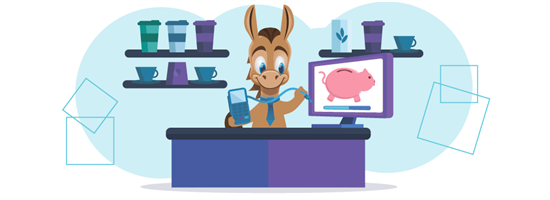 |
| © CreditDonkey |
The process for handling credit cards will vary depending how your business operates. Keep reading to learn more.
In Store
In order to accept credit card payments in a brick-and-mortar store, you need a way to read the credit cards. So-called card-present transactions require a credit card reader or POS (point of sale) system.
Depending on the type of equipment purchased, customers will swipe, tap, or dip their credit card into the reader. The payment processor then takes over the transaction, communicating behind the scenes with the card network, issuing bank, and eventually, your merchant account.
Card present transactions are generally the least expensive because they involve less risk—it's harder to fraudulently use a credit card in person.
Over the Phone
Accepting credit card payments over the phone carries a higher level of risk than accepting in-person payment.
If you have a POS for your brick-and-mortar store, you can manually enter the credit card information into the system and process it the same way as an in-person transaction. But the processing fees are typically higher for keyed-in transactions because of the higher risk of fraud.
Online stores that don't have a POS can use their virtual terminal to accept credit card payments over the phone. A virtual terminal turns your computer or tablet into a credit card terminal. Then, just as you would with a POS, you enter the credit card numbers manually, but in the online software program.
On Your Phone or Tablet
If your business is mobile or you don't want to invest in expensive POS software, you can turn your phone or iPad into a credit card reader with the addition of a mobile card reader.
Your customers can swipe, tap, or dip their card just as they would on a standard credit card reader. The only difference is the reader is attached to your phone or tablet, which sends the signal to process the transaction.
In PayPal
PayPal offers two methods to accept credit card payments—one free option and one with a monthly fee:
- PayPal Payments Standard
You create a PayPal button (no programming skills required) in approximately 15 minutes and add it to your website. After clicking the button, customers will navigate to the PayPal website, where they can pay with a credit card. You pay a per transaction fee, but no monthly fees. - PayPal Pro
If you'd prefer to keep customers on your website from purchase through final transaction, PayPal Pro allows the integration of PayPal processing on your website. There is a $30 monthly fee, but you pay the same flat-rate processing fees as you would with PayPal Standard.
How to Receive Money From Credit Card Transactions
 |
| © CreditDonkey |
Once you're ready to accept credit cards, how will you receive the funds? Here's a step-by-step guide to the process:
- You send a batch of authorized transactions to the payment processor at the end of each business day.
- The payment processor sends the information to the appropriate card network.
- The card network sends the information to the issuing bank.
- The issuing bank sends the funds electronically to the merchant account, less the third-party fees for processing the transaction.
The entire process typically takes 24–48 business hours from the date that you sent the batch into the payment processor.
The payment process occurs in several steps:
- The credit card information is entered.
- The payment processor transmits the information between the customer's bank account and the merchant account.
- The payment processor checks for the availability of funds, ensuring that the transaction doesn't exceed the credit limit and checks for any signs of fraudulent activity.
- If the card issuer and the customer's bank approve the transaction, the payment processor deposits the funds (minus any fees, see below) into your merchant account.
Understanding Credit Card Fees
Accepting credit card transactions comes with some costs. First, there are the interchange fees, which are non-negotiable fees charged by the card networks.
Visa, Mastercard, Discover, and Amex each charge a percentage of the transaction for their services. The fees vary based on the type of transaction (card present, keyed in, or online).
In addition to the card network fees, there's the fee structure the card processor charges. Typically, you can choose:
Interchange Plus
Most processors charge a flat fee on top of the interchange fee. You'll see it noted as a percentage plus the flat fee, such as 2.9% + $0.30. The $0.30 is the markup fee per transaction for the processor.
AMEX interchange rates typically exceed those of Visa, Mastercard, and Discover, which is why many businesses don't accept AMEX. The fees are higher because AMEX doesn't make most of their profits from interest like Visa and Mastercard. Instead, they make it on merchant fees and annual fees charged to customers.
Flat Fees
PSPs typically charge flat-rate fees or one fee per transaction. The rate includes the fees for most services, including PCI compliance, refunds, inactive account fees, chargebacks, and early termination fees.
Tiered Fees
Some companies base the fees on the type of transaction. For example, swiped credit card transactions will typically cost less than keyed-in transactions because of the lower risk of fraud.
Others tier the rates based on the volume of transactions—the more sales you process, the lower your per transaction fee becomes.
Tips and Tricks on Accepting Credit Cards Safely
Accepting credit card payments means handling sensitive information. It's important that as a business owner, you know how to securely process the transactions.
Here are some tips to help you out:
- Be wary of fraud and chargebacks.
Not all credit card systems are the same, and some are safer to use than others. Make sure that your payment gateway offers fraud prevention tools such as Address Verification Service (AVS), Card Verification Value (CVV), and device identification.Chargebacks, on the other hand, can be hard to avoid. Even if you didn't do anything wrong as a business, you may end up dealing with a chargeback.
What is a chargeback?
A chargeback happens when a customer successfully disputes a transaction with your business. The payment made to your business will be returned to their account. It's usually due to them not recognizing the transaction and therefore reporting it as fraud. But other reasons may also cause chargebacks.Some processors have chargeback fees. If you're a high-risk business, it may be better to find processors without such fees.
- Train your employees.
If you're a small business owner, then you're likely not going to be in your store the entire time. Your employees should know how to operate the POS system without you. That way, they can take credit card payments with no errors or trouble.You can also restrict access to certain employees. This controls who sees sensitive customer information and who doesn't.
- Use well-known and trusted processing software and equipment.
There are many POS providers in the market. They make taking credit card payments easy. However, you don't want to work with just anyone.Chase Payment Solutions is one of the trusted providers you can work with.
- Only store credit card data when necessary.
Storing credit card data makes you vulnerable to attacks. Don't store them unless necessary (i.e., if you take recurring payments from your clients).Make sure that credit card data is encrypted. Processors typically provide end-to-end encryption for this.
If you do decide to store data, there are only specific data you're allowed to store. These are the cardholder's name, Primary Account Number (PAN), expiration date, and service code. You cannot store, even with encryption, sensitive authentication data, PIN, PIN block, and CVV or CVC.
- Always ask the customer's phone number for over-the-phone payments.
Taking your customer's phone number means you can follow up if there is any more information you need. After processing the order, be sure to keep the receipts until your customer receives their order.In general, you can choose to keep receipts or records of transactions for a set period. You can keep them for 12 to 24 months, for example. This ensures that you have the data you need in case customers make a dispute or ask for chargebacks. Your receipts or record can ensure that the transaction was legitimate. - Uphold PCI compliance.
PCI requirements are set by the Payment Card Industry Security Standards Council. It's an independent body created by the card networks. Although compliance is not determined nor enforced by the government, it can cost you enormous fees if you fail to comply.The steps to becoming PCI compliant depend on your agreement with your payment service provider or merchant service provider.
The Ins and Outs of Refunds
If your business processes refunds, knowing how it affects your processing fees is important. This only affects businesses on the interchange plus processing model.
If you are on a tiered plan or flat-rate fee plan, you won't see a difference in your processing fees, as these models don't refund your processing fees on returns.
Businesses on the interchange-plus plan can experience any of the following:
- No Refund
Some companies just don't refund the interchange fee. Read the fine print regarding refunds before signing an agreement. - Refunds Deducted From Monthly Volume
Some processors run the processing fees monthly, deducting the total refunds for the month from total monthly sales. This reduces the amount of processing fees you owe accordingly. - Charges for Refunds
Some processors charge an authorization fee for processing the refund.
Bottom Line
Accepting credit card payments can help your business grow. Pay close attention to the services offered by your merchant account or payment service provider. Your average transaction price, as well as the monthly volume, will also help you choose the right provider.
References
- ^ Deloitte. Getting Ahead of the Curve, Retrieved 01/31/2023
- ^ FRBSF. Diary of Consumer Payment Choice, Retrieved 01/31/2023
Write to Kim P at feedback@creditdonkey.com. Follow us on Twitter and Facebook for our latest posts.
Note: This website is made possible through financial relationships with some of the products and services mentioned on this site. We may receive compensation if you shop through links in our content. You do not have to use our links, but you help support CreditDonkey if you do.
Not sure what is right for your business?
|
|
|
Answer a few short questions in our credit card processing quiz to receive tailored recommendations to help you keep more profits.
|
|
| ||||||
|
|
|




